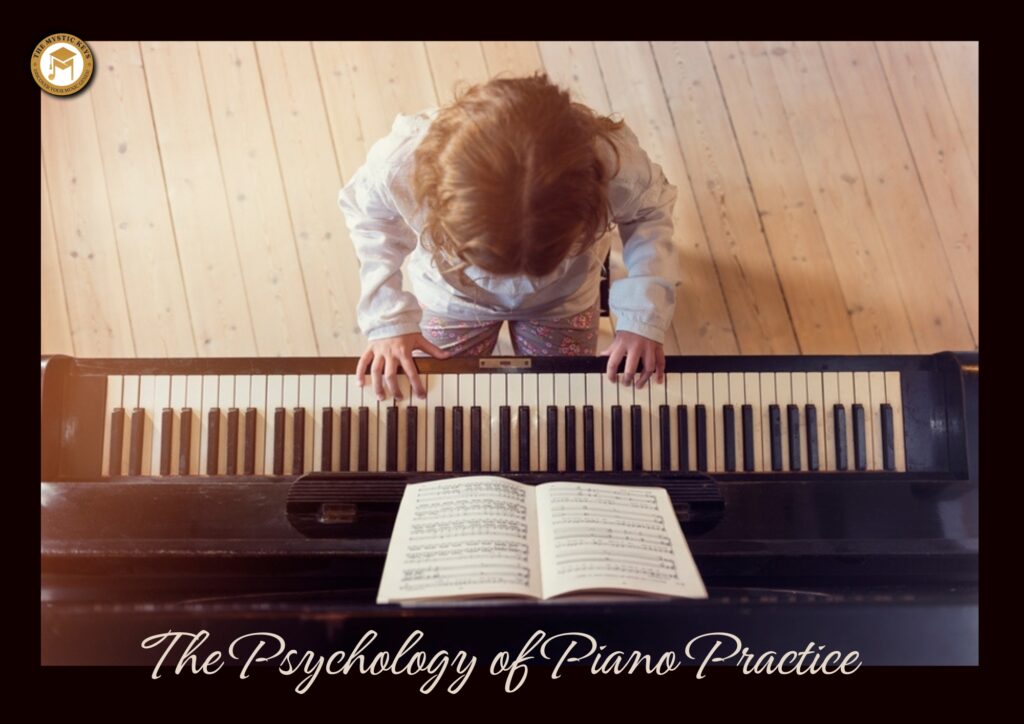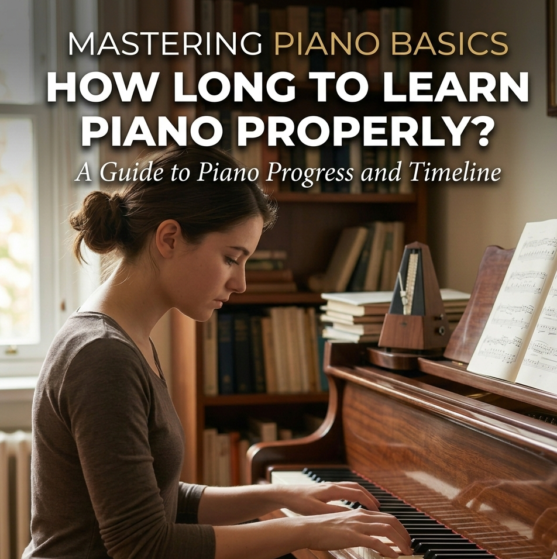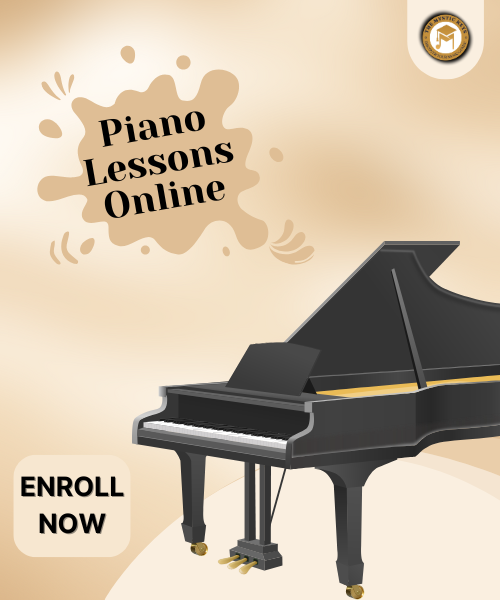The Psychology of Piano Practice | Stay Motivated and Consistent
There’s something deeply magical about the piano. Its rich tones, expressive range, and the sheer satisfaction of playing a well-learned piece make it one of the most loved instruments across the world. Yet, behind every graceful performance lies hours of practice — practice that, for many learners, often feels inconsistent, frustrating, or even discouraging. This is where understanding the Psychology of Piano Practice becomes essential. By exploring how our minds respond to learning, motivation, and routine, we can make piano practice not just more effective, but also more fulfilling and enjoyable.
So why do some pianists stay the course while others give up halfway?
It turns out that successful practice isn’t just about finger strength or music theory — it’s about understanding how our minds work. The psychology behind piano practice can unlock more effective, enjoyable, and lasting results. If you’ve ever struggled to stay motivated or wondered why your practice sessions don’t always yield progress, this exploration is for you.
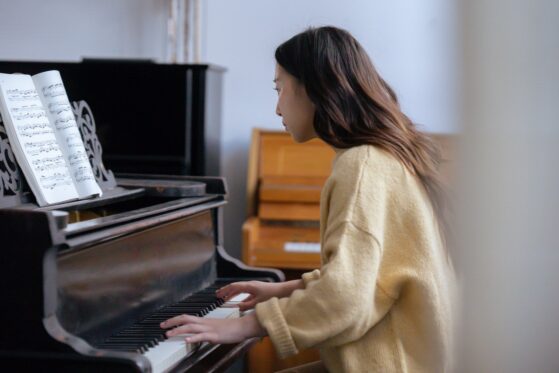
Rediscovering Your “Why”
At the beginning of every musical journey, there’s usually a spark — maybe it was a performance that moved you, or a deep inner desire to express yourself. But over time, that spark can fade when confronted with scales, mistakes, and slow progress. That’s why it’s important to continually revisit your inner motivation.
Psychologists distinguish between intrinsic and extrinsic motivation. Intrinsic motivation is when you practice because you genuinely enjoy it — for the joy of playing, the sense of achievement, or the emotional connection with the music. Extrinsic motivation, on the other hand, is about external rewards — passing an exam, impressing others, or meeting your teacher’s expectations.
Interestingly, long-term consistency thrives best when intrinsic motivation is at the core. It’s not that exams or performances are bad; in fact, they can offer great structure and purpose. But unless you also enjoy the journey, you may find it hard to keep going when things get tough.
Try reminding yourself regularly why you started playing. Play your favorite piece, even if it’s not perfect. Watch performances that inspired you in the first place. And most importantly, allow moments of joy during your practice — not just perfection.

From Goals to Habits | Building a Practice Routine that Lasts
Motivation is just the beginning. What sustains growth is habit. Unfortunately, most people think of habit as discipline or willpower. In reality, habit is about design — creating an environment and a rhythm that makes practice natural, not forced.
Let’s say you aim to practice 30 minutes a day. If you leave it to whenever you’re “in the mood,” it likely won’t happen consistently. But if you decide that right after school or dinner, you’ll sit down at the piano for even just 10 minutes, it becomes anchored into your daily rhythm. Over time, your brain begins to associate that time or cue (like finishing homework) with music. That’s the power of habit.
You don’t need to practice for hours to grow — short, focused sessions done regularly are far more effective than long ones done sporadically. Even five minutes a day, done mindfully, can create momentum. The key is consistency, not intensity.
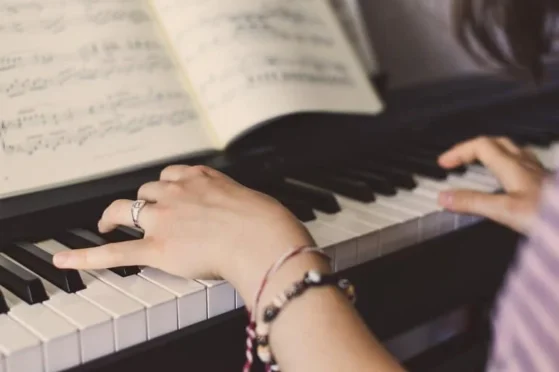
The Role of the Mind | Focus, Frustration, and Flow
Practicing the piano is also an exercise in mental focus. When you sit at the keyboard, you’re engaging your memory, motor skills, emotional response, and problem-solving abilities all at once. No wonder it feels exhausting some days!
On those tough days, it’s normal to feel stuck or bored. The piece might feel too difficult, your hands might not cooperate, or your mind might wander. This is where understanding your mental state can help.
Instead of pushing through with frustration, try pausing and shifting your approach. Break the piece into smaller sections. Slow things down. Or switch to a simpler song for a while. Giving your brain small wins helps rebuild momentum.
On the other hand, some days, you’ll enter what’s called a flow state — that magical moment when time disappears, and you’re completely immersed in the music. These moments are what many musicians live for, but they can’t be forced. What you can do is create the conditions for flow: minimal distractions, clear goals, and a piece that’s challenging but not overwhelming.

Why Mistakes Matter (and How to Embrace Them)
One of the biggest psychological barriers for pianists is perfectionism. We often treat mistakes as signs of failure, when in reality, they’re signs that we’re learning. Every slip-up reveals where your fingers, ears, or mind need more attention. Instead of fearing mistakes, embrace them as part of the process.
Think of each practice session as a lab — a place to experiment, observe, and grow. If you’re struggling with a passage, that’s not a reflection of your worth as a pianist. It simply means your brain is still figuring it out.
And that’s okay.
When you shift your mindset from “I must play this perfectly” to “I’m learning how to improve,” your frustration turns into curiosity. You become more patient with yourself — and ultimately, more resilient.
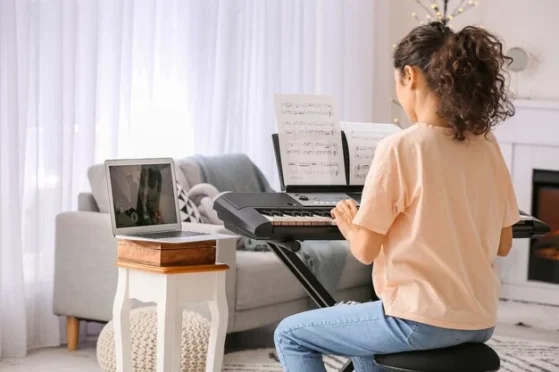
The Hidden Power of Reflection
One often overlooked yet powerful tool in the psychology of piano practice is reflection. Just a few minutes of thoughtful journaling or mental review after your session can create lasting impact. Ask yourself:
What went well today?
What felt difficult, and why?
What will I try differently tomorrow?
This kind of reflection goes beyond tracking progress — it reinforces what you’ve learned, builds deeper self-awareness, and strengthens your internal motivation. By engaging with your thoughts and emotions around practice, you’re applying psychological insight to accelerate musical growth. Some students even record short weekly practice videos as visual diaries — clear evidence of how far they’ve come and how much they’ve evolved.

Staying Inspired for the Long Haul
Let’s be honest — there will be days when you simply don’t feel like practicing. That’s normal. What matters is what you do next.
Sometimes, the solution is rest. Taking a break can refresh your mind and restore your passion. Other times, what you need is inspiration. Watch a concert, listen to a new composer, or try learning a piece outside your usual style.
Even better, connect with other learners. Join a music community, attend group lessons, or play for family and friends. When music becomes social, it becomes more meaningful. You’ll feel encouraged, challenged, and seen.
And finally, don’t forget to celebrate. Celebrate your first song, your first scale, your first performance. Every small milestone is a step forward — and every step deserves recognition.

A Final Note
The journey to becoming a skilled pianist isn’t about flawless performances or endless hours at the keys. True growth comes from your mindset, your daily habits, and the connection you build with your instrument. When you begin to understand the psychology of piano practice — your motivation, focus, and emotional responses — you’ll find the strength to stay consistent, even on the toughest days.
So the next time you practice, breathe deeply. Release the pressure. Let yourself connect with the music. Trust the process. After all, every accomplished pianist once stood where you are — a beginner who simply chose to keep playing.
If you’re looking for expert guidance that nurtures both your technique and your mindset, explore our Piano Lessons Online at The Mystic Keys. Our platform is more than just instruction — it’s a supportive space where your musical journey is understood, encouraged, and truly valued.
Related Blogs
Perfect Piano Posture & Hand Position | Play Comfortably and Efficiently
Playing the piano requires more than just pressing keys—it’s about achieving the perfect balance of relaxation and control. Your posture and hand position determine how efficiently you play, how well you avoid injury, and how easily you progress in technique.
How to Develop Finger Independence for Smooth Piano Playing
Developing finger independence is a cornerstone of proficient piano playing. It enables pianists to execute complex passages with precision, expressiveness, and fluidity.
Piano Practice Structure for Effective
Improvement
At The Mystic Keys, we believe that mastering the piano practice structure is a journey that combines passion, discipline, and the right guidance. Whether you’re a beginner or an advanced pianist, a structured practice routine is the cornerstone of progress.


